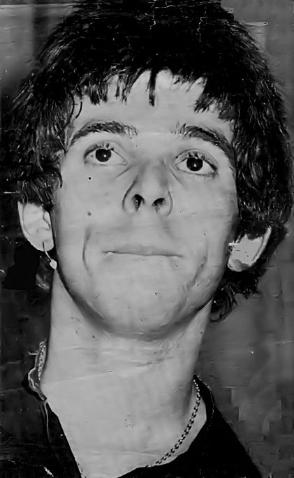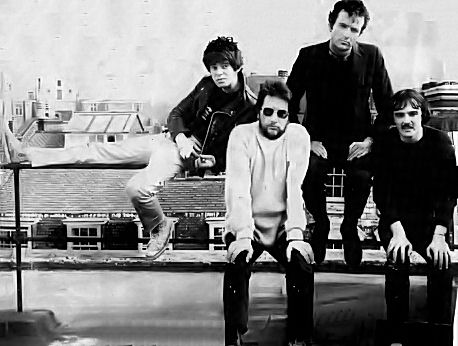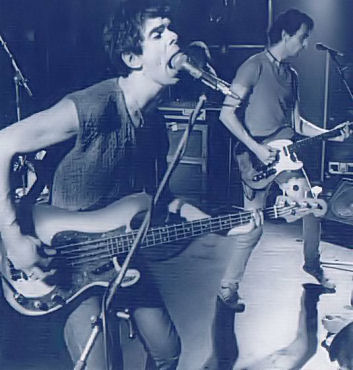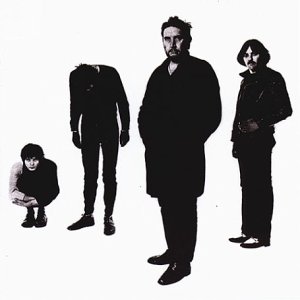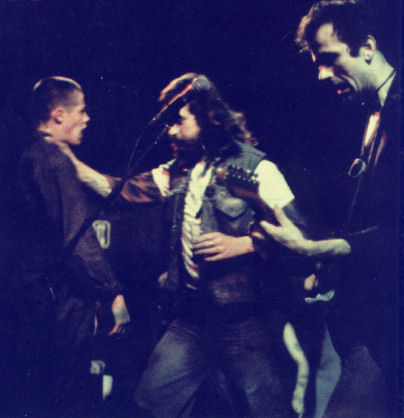The Stranglers approve of Hell's Angels but they don't like Journalists. In fact,
Jean-Jaques Burnel, fresh from hitting one writer, would like to give this same
treatment to MM's Harry Doherty. Just as well we sent Chris Brazier to probe the
Black side of
JEAN -JACQUES BURNEL stalks around the table like a caged leopard as he
speaks, pervading the atmosphere with a sense of unrelenting physicality, his
hands bandaged after a bike crash the night before.
Hugh Cornwall stares at me from his seat on the other side of the table, his
expression fixed somewhere between hostility and curiosity.
Dave Greenfield sits tight, rarely contributing, and Jet Black hasn't shown up. Me? Well, I'm
struggling to conceal my unease, because if I hadn't already heard about the Stranglers' violent
antipathy to music journalists, they wouldn't have left me in the dark for long.
Cornwall reckons the only journalists he's ever liked have given it up pretty quickly (the only good
reporters are dead ones?), "it's not exactly an honourable profession, is it? Journalists don't seem
to have the right ideas about anything ”mindless writing. Give it up, become a bus driver."
They've all been aggrieved and angered to an amazing degree by Harry Doherty's review of their
"Black And White" album (Melody Maker, May 20th 1978), which seemed both innocuous and
approving to me.
Burnel's reaction, particularly, is ridiculously extreme, he punctuates his threats by kicking the wall
with unnerving venom, unmistakably proud of having attacked a Sounds writer, Jon Savage, after
his review of their second album. "Yeah, in fact I wanted to see Harry Doherty here."
To discuss it with him?
"No, there's point in discussing things like that," he answers menacingly. "It was condescending, and
I don't like being patronised by people with smaller brains than ourselves. He will go the same way as
Jon Savage” tell him to stay out of town, keep out of my way.
"I cannot accept personal criticism because it's not valid ”it's vindictive, some of these writers have
personality problems."
But all we do is express our opinion ..." No! He's not expressing his own opinion, he's expressing his
own paranoias and weaknesses and phobias.
Just 'cos they have an ideal of something, like Jon Savage, who got his face crunched . . ." (he
stresses the word with obvious relish).
"If writers upset people through their bitterness and personal hang-ups then they've got to expect to be 'put upon.' It's the law of the jungle."
And you believe in the law of the jungle?
"Certainly, otherwise you end up like Sweden."
A country they have no love for, as their song " All Quiet On The Eastern Front " shows.
The Stranglers are problem figures for me, mainly because of my past enthusiasm for them. I was one of the few who didn't jeer them when they
supported Patti Smith at the Roundhouse in the spring of '76, I was actually so knocked out that I caught them four more times that year, a high
that swept me right through 'Rattus Norveglcus' and into the summer.
They were such a potent combination, each instrument so thrusting and distinctive (though it was Cornwell's guitar that hit me hardest, I shall carry
his solo from 'Sometimes' with me to the grave), and it was a shock when I was forced to acknowledge the repulsive sexism in some of their songs.
Until the album was unveild I'd never realised that, the only culpable words that had been discernible in concert being those to 'Peaches', which,
God help me (and them) I'd assumed to be a parody of male sexual chauvinism, simply, I suppose, because I couldn't (and didn't want to) imagine
artists I liked singing so retrogressive and so banal a lyric.
When, eventually, their obnoxious attitude to women was coupled with the general boorish sterility of 'No More Heroes' I gave them up as a lost
cause. 'Tank', 'Outside Tokyo' and 'Toiler On The Sea' (along with ...the great version of 'Walk On By' on the free single) are the only tracks on the
new album which re-kindle my interest, I find the 'black side largely unlistenable, but they're still intriguing as people, particularly Jean-Jacques,
whose alternation between intelligent discussion and "law of the jungle" outbursts is really quite frightening.
We left the conversation in Sweden. Why is it so terrible?
Hugh: "Ask the Swedes. They've got nothing going for them except the clouds, great cloud formations,"
JJ: "Everything is catered for them, tramps can't sleep under a bridge without being fed and clothed; the Regeri have got council estates."
Hugh: "See, in Sweden there's so few people that they're not forced to live in close proximity, they
can afford the space to be separate.
Societies and communities thrive when people are on top of each other, always have done. In
Sweden, there's a complete thumb from Big Brother to stamp out all private enterprise and creativity."
You link individual creativity with private enterprise?
JJ: "Well look, the oldest form of private enterprise known to we Europeans is l'artisanat, or
artisanship, which as far as I'm concerned is the only acceptable form of private enterprise. It's a
group unit or team, not a syndicate or a large-scale corporation, it's very honest, sort of like the
smithy down the road, I'artisanat is the intrinsic European way."
Which nails on the head a long-standing and inexplicable myth about them being Trotskyists.
Hugh: "Oh people have had a lot of ideas about what we're into."
JJ: "But we never denied half those scandalous, libellous things said about us."
Hugh: " We just mentioned Trotsky in one song because he had a life that was monumental, that
doesn't mean we belong to a society which meets and sees films of an ice-pick going into his head
and discuss ad infinitum his ideas. I mean, 'Marxist leanings'! I've apparently got Marxist leanings
because I hang to the left."
They're anxious to convey their actual political ideas via the latest issue of Strangled, which they
claim is the only fanzine still thriving. They give its editor a free hand but contribute to it themselves,
and either sell or give away eight to ten thousand copies, though they reckon on a readership of
about three times that.
The current issue (the sixth) carries an intelligent survey by Burnel of the -present world situation, which begins by saying that they chose " Black
And White" for the album-title as a representation of the extremes before them. He sees Europe as caught between the two evils of Russian state
capitalism and American materialistic over-indulgence, and hopes for a new system founded on the individual spirit and " I'artisanat," and
sustained, by a united Europe equal in strength to the two major powers.
" You see," says Cornwell, "we can achieve more with an organ like that than by attending Anti-Nazi rallies and going to Cuba."
JJ (with great contempt): "And having fun on a little Sunday march with half the people not knowing what it's all about."
However much the piece in Strangled achieves, I find this kind of dismissal of the Anti-Nazi Rally, a genuine and important expression of mass
feeling — difficult to understand, and I just don't believe people were unaware what they were marching against.
Burnel continues: "I think we should start looking to our roots. It's okay for black people to talk about their roots, but
we Europeans have them, too. We have roots in economic systems and we have much deeper cultural roots, and we
shouldn't be deferring to Washington, nor to Moscow either.
"I don't mean the EEC, but there will probably be just six states soon, we're moving towards Continentalism, and the
sooner one is aware of it the more positive one can be about it.
"Europe is a cultural entity made up of lots of different tribes with the same roots. All the Indo-European languages
show evidence of some kind of ancient communion, a root way before Latin. There are only two languages devoid of
roots in Europe, Basque and Finnish.
" Why is everyone so paranoid about losing their cultural identity?"
But all you really mean is that you're a strong supporter of the EEC ..." No, I'm not, the EEC is an economic system
which is fucking the Continental cause up. You see people seem to have a total lack of imagination when it comes to
devising their ideals, adopting their stance.
"Like in Sweden, the Regeri think 'aah, American Graffiti, Fifties, rock 'n' roll,' something where it's easy, it's all laid out
for them. And then you've got all the other wimps who think 'aah, Moscow or Peking.'
"To me these are all cop-outs, they don't have the roots strength which is what you need if you wanna get somewhere.
You need a bit of passion and fanaticism, and you won't get it by adopting others' ideals.
"There's this interesting book, 'Marx Is Dead, God Is Dead, And I'm Not Feeling Too Well Myself', which was written by
a 1968 Paris dissident, there was a whole group of guys in '68 who had a lot of passion about things but because they didn't know quite where they
were going they adopted ready-made slogans.
"Now they're disillusioned, "les nouveaux philosophes."
Whether you agree with him or not, Burnel is clearly talking sensibly here, yet his Europeanism can spill over into extreme chauvinism, as he
showed when I asked about their recent American tour (Dave Greenfield just had time to say they'd gone down better than they'd expected before
Burnel broke in.
There was nothing there we couId appreciate, nothing in the American culture that appealed to our superior Europeanism. They had nothing to
offer us and we had so much to offer them.
Most people seem to have an inferiority complex and think America is better, which is an amazing result of postwar brainwashing because everyone
knows that Americans have got smaller brains. Fact of life, you know, they're just inferior specimens."
"Inferior specimens?" Dangerous words, and we're approaching the darker, more objectionable end of Stranglerdom (what's that in the shadows?)
Their relationship with the Hell's Angels in Amsterdam is one thing I've been wanting to ask them about ever since I saw a 999 gig there in January'
at which individual Angels jumped down into, the audience, periodically picking someone at random to attack. Not surprisingly, everyone in the hall
was scared, and the concert was totally disrupted, most people panicking and leaving early.
You get on well with the Amsterdam Angels don't you, Hugh?
"Yeah, they're mates, mutual respect."
Why do you respect them?
"They've got about the only culture which is alternative, they've got their own
community which lives outside of the law. The law leaves them alone, and they
leave the law alone."
JJ: "In a way they're living out their ideals. And also we were the first people who
weren't intimidated by them, so they thought ' great, we don't nave to bully these
people'."
Don't you think what happened at the 999 gig was bad?
"What! Bad that 24 Hell's Angels managed to panic 700 punters?"
They were pretty vicious.
"24 guys panic 700 people! I mean, who's together?
You know about the Bolsheviks and the Mensheviks?
Lenin preferred to have a few 'together' people than a lot of middle-way
uncommitted people."
I wouldn't call the Angels I saw 'together people.' It was indiscriminate violence.
"The band could have stopped it by taking a stand on the stage, we take control
ourselves"
But you could you have have made the situation easier without the band going
against the angels.
"Well let me tell you, they started doing that at our gig in Amsterdam, the President
actually was doing it, and I just went over to him and asked him to stop. And he did
they're cool guys, you just have to approach them individually."
"Cool guys" wouldn't attack people in the first place.
"Are you saying that aggression per se is wrong? Are you saying that?" Yes, it
should be avoided.
"But there's a point where there's a need for aggression, like if our parents had been aggressive a bit earlier there wouldn't have been the Second
World War."
But the Hell's Angels as a cult glorify violence.
"No, they glorify individuality and freedom, but individuality within the pack. Anyway, next question."
You don't want to go into it?
"Well you're not informed. If you're not used to situations of tension and violence, then you should swot up on it and then I'll talk to you."
But I'm interested in your opinion of them as a cult.
"What, having their own places, and their own machines, and minding their -own business?" And terrorising innocent peaceful people . . .
"Speak to a Hells Angel about it, I don't have to talk to you about Hell's Angels." And he closes the topic by walking out of the room.
Still, Hell's Angels fit into the Stranglers story pretty well with their stress on male comradeship (especially as warriors) and the subservient, sex-
orientated role that women play in the Angels scheme of things...
The Stranglers are one of the most masculine (macho) of rock bands, and they have encouraged a tight-knit, "tough" following in the Finchley
Boys which' is probably comparable to the Angels.
With this preoccupation with hard, aggressive (and hopefully outdated) maleness in mind 'Death And Night And Blood (Yukio)' from the new album
becomes a song of central importance. I asked Burnel about the chorus, which seemed unrelated to the rest of the words, "Hey little baby/Don't you
lean down low/Your brain's exposed and it's starting to show/Your rotten thoughts Yeuch.
"Well if you think that," he said, "you must have a very limited knowledge of Yukio (Mishimu). That's a chorus about women and it's very much a
part of Yukio. You know he was homosexual, in the best possible warrior way, like the Spartans, the Samurai, and Alexander the Great's guard. It
was an integral part of their warrior-hood, of being very close to fellow warriors. Has to be like that, because you don't take women to war with you."
Burnel's assertion that the song's chorus is about women in genera! makes it perhaps the Stranglers' most viciously
sexist moment ever, just when we were thinking they'd relegated their songs about women
to the farcical level of "Tits" on this album's free single, a piece they claim was included to
play up the male chauvinism and thus take the piss out of moralistic journalists.
Hugh: "Every song we write is in praise of women, yet everyone thinks we hate them."
But you only praise them as objects of male desire , . .
"So? That's what they've always been." But that's the role they're trying to break out of,
and we should be helping them . . . "You reckon they are? About five per cent. The
greatest enemy to breaking out are the other women who don't want to break out."
You wouldn't object to being sex objects yourselves then?
JJ: "Everyone wants to be a sex object. When you're trying to pull a chick, man, don't tell
me that you wouldn't like her to be after your body. Don't be a middle-class intellectual
bigot. I mean when you want to turn a chick on, or a guy if that's your problem, then do you
say 'love me for my mind'?
"There's so much bigotry about these hi-faluting liberal ideas."
But ... "BUT NOTHING!!! He shouts violently, losing control for a frightening second, then
laughs it off and says "sorry."
Hugh (with contemptuously exaggerated politeness): "Does that clear that point up?"
Well, no. "Oh, why not?" I launch into a futile attempt to persuade them that women are
oppressed and degraded by traditional male attitudes, to which their only response is
Burnel's "Always give a woman a good orgasm, very important, too many men are selfish."
Despairing, I give it one more try. What do you think of the Women's Movement then?
Hugh. "I like women to move when I'm on top of them."
JJ: "I like most women's movements."
Very funny.
Aren't you worried by the reaction to your attitude to women?
Hugh: "No, that'd be giving it false value, the press doesn't stop our
audience liking us."
So you're not worried about your image?
"We don't have an image, we're the most image less band there is. We go
on stage in the clothes that we ;get up in."
Do you still want to steer clear of the superstar bit?
JJ: "We're doing pretty well. I mean a lot of people came backstage at that
last Brighton gig." Why have you given up your policy of avoiding the
bigger halls?
"We're still playing small places and we intend playing small places ad
infinitum."
So why are you playing Bingley Hall? " Dunno about Bingley Hall, we might
pull out of it. We've got a meeting with the lawyers about it this afternoon."
Hugh: "You see, you've got conflicting ideals, cos there are so many
people who wanna see us who are under 18, and if you play places with
bars they're limited from getting in."
JJ: "Anyway we got so knocked by people like you for playing five nights at
the Roundhouse and breaking the Who and Stones house records."
I would never have knocked you for that.
"Fuck off! Besides, by the fifth night it was almost like clocking in, there was no buzz for us."
Burnel concludes the interview with another threat to Harry Doherty, so I ask him alone why he resorts to violence so easily.
"You seem to think we glorify violence," he answered, " but we don't you know, we just recognise its usefulness. It's crazy to be unprepared.
"When I was small my mum used to take me to school every day and kiss me goodbye, which is something French mothers are in the habit of
doing, and the kids at school used to beat me up because they thought it was cissyish. That is, until my dad taught me how to fight and I eventually
learned karate."
That one story could explain a hell of a lot.
THE END
(This interview is from the Don't Care Archives - Melody Maker, June 3rd, 1978 )
Jean-Jaques Burnel, fresh from hitting one writer, would like to give this same
treatment to MM's Harry Doherty. Just as well we sent Chris Brazier to probe the
Black side of
JEAN -JACQUES BURNEL stalks around the table like a caged leopard as he
speaks, pervading the atmosphere with a sense of unrelenting physicality, his
hands bandaged after a bike crash the night before.
Hugh Cornwall stares at me from his seat on the other side of the table, his
expression fixed somewhere between hostility and curiosity.
Dave Greenfield sits tight, rarely contributing, and Jet Black hasn't shown up. Me? Well, I'm
struggling to conceal my unease, because if I hadn't already heard about the Stranglers' violent
antipathy to music journalists, they wouldn't have left me in the dark for long.
Cornwall reckons the only journalists he's ever liked have given it up pretty quickly (the only good
reporters are dead ones?), "it's not exactly an honourable profession, is it? Journalists don't seem
to have the right ideas about anything ”mindless writing. Give it up, become a bus driver."
They've all been aggrieved and angered to an amazing degree by Harry Doherty's review of their
"Black And White" album (Melody Maker, May 20th 1978), which seemed both innocuous and
approving to me.
Burnel's reaction, particularly, is ridiculously extreme, he punctuates his threats by kicking the wall
with unnerving venom, unmistakably proud of having attacked a Sounds writer, Jon Savage, after
his review of their second album. "Yeah, in fact I wanted to see Harry Doherty here."
To discuss it with him?
"No, there's point in discussing things like that," he answers menacingly. "It was condescending, and
I don't like being patronised by people with smaller brains than ourselves. He will go the same way as
Jon Savage” tell him to stay out of town, keep out of my way.
"I cannot accept personal criticism because it's not valid ”it's vindictive, some of these writers have
personality problems."
But all we do is express our opinion ..." No! He's not expressing his own opinion, he's expressing his
own paranoias and weaknesses and phobias.
Just 'cos they have an ideal of something, like Jon Savage, who got his face crunched . . ." (he
stresses the word with obvious relish).
"If writers upset people through their bitterness and personal hang-ups then they've got to expect to be 'put upon.' It's the law of the jungle."
And you believe in the law of the jungle?
"Certainly, otherwise you end up like Sweden."
A country they have no love for, as their song " All Quiet On The Eastern Front " shows.
The Stranglers are problem figures for me, mainly because of my past enthusiasm for them. I was one of the few who didn't jeer them when they
supported Patti Smith at the Roundhouse in the spring of '76, I was actually so knocked out that I caught them four more times that year, a high
that swept me right through 'Rattus Norveglcus' and into the summer.
They were such a potent combination, each instrument so thrusting and distinctive (though it was Cornwell's guitar that hit me hardest, I shall carry
his solo from 'Sometimes' with me to the grave), and it was a shock when I was forced to acknowledge the repulsive sexism in some of their songs.
Until the album was unveild I'd never realised that, the only culpable words that had been discernible in concert being those to 'Peaches', which,
God help me (and them) I'd assumed to be a parody of male sexual chauvinism, simply, I suppose, because I couldn't (and didn't want to) imagine
artists I liked singing so retrogressive and so banal a lyric.
When, eventually, their obnoxious attitude to women was coupled with the general boorish sterility of 'No More Heroes' I gave them up as a lost
cause. 'Tank', 'Outside Tokyo' and 'Toiler On The Sea' (along with ...the great version of 'Walk On By' on the free single) are the only tracks on the
new album which re-kindle my interest, I find the 'black side largely unlistenable, but they're still intriguing as people, particularly Jean-Jacques,
whose alternation between intelligent discussion and "law of the jungle" outbursts is really quite frightening.
We left the conversation in Sweden. Why is it so terrible?
Hugh: "Ask the Swedes. They've got nothing going for them except the clouds, great cloud formations,"
JJ: "Everything is catered for them, tramps can't sleep under a bridge without being fed and clothed; the Regeri have got council estates."
Hugh: "See, in Sweden there's so few people that they're not forced to live in close proximity, they
can afford the space to be separate.
Societies and communities thrive when people are on top of each other, always have done. In
Sweden, there's a complete thumb from Big Brother to stamp out all private enterprise and creativity."
You link individual creativity with private enterprise?
JJ: "Well look, the oldest form of private enterprise known to we Europeans is l'artisanat, or
artisanship, which as far as I'm concerned is the only acceptable form of private enterprise. It's a
group unit or team, not a syndicate or a large-scale corporation, it's very honest, sort of like the
smithy down the road, I'artisanat is the intrinsic European way."
Which nails on the head a long-standing and inexplicable myth about them being Trotskyists.
Hugh: "Oh people have had a lot of ideas about what we're into."
JJ: "But we never denied half those scandalous, libellous things said about us."
Hugh: " We just mentioned Trotsky in one song because he had a life that was monumental, that
doesn't mean we belong to a society which meets and sees films of an ice-pick going into his head
and discuss ad infinitum his ideas. I mean, 'Marxist leanings'! I've apparently got Marxist leanings
because I hang to the left."
They're anxious to convey their actual political ideas via the latest issue of Strangled, which they
claim is the only fanzine still thriving. They give its editor a free hand but contribute to it themselves,
and either sell or give away eight to ten thousand copies, though they reckon on a readership of
about three times that.
The current issue (the sixth) carries an intelligent survey by Burnel of the -present world situation, which begins by saying that they chose " Black
And White" for the album-title as a representation of the extremes before them. He sees Europe as caught between the two evils of Russian state
capitalism and American materialistic over-indulgence, and hopes for a new system founded on the individual spirit and " I'artisanat," and
sustained, by a united Europe equal in strength to the two major powers.
" You see," says Cornwell, "we can achieve more with an organ like that than by attending Anti-Nazi rallies and going to Cuba."
JJ (with great contempt): "And having fun on a little Sunday march with half the people not knowing what it's all about."
However much the piece in Strangled achieves, I find this kind of dismissal of the Anti-Nazi Rally, a genuine and important expression of mass
feeling — difficult to understand, and I just don't believe people were unaware what they were marching against.
Burnel continues: "I think we should start looking to our roots. It's okay for black people to talk about their roots, but
we Europeans have them, too. We have roots in economic systems and we have much deeper cultural roots, and we
shouldn't be deferring to Washington, nor to Moscow either.
"I don't mean the EEC, but there will probably be just six states soon, we're moving towards Continentalism, and the
sooner one is aware of it the more positive one can be about it.
"Europe is a cultural entity made up of lots of different tribes with the same roots. All the Indo-European languages
show evidence of some kind of ancient communion, a root way before Latin. There are only two languages devoid of
roots in Europe, Basque and Finnish.
" Why is everyone so paranoid about losing their cultural identity?"
But all you really mean is that you're a strong supporter of the EEC ..." No, I'm not, the EEC is an economic system
which is fucking the Continental cause up. You see people seem to have a total lack of imagination when it comes to
devising their ideals, adopting their stance.
"Like in Sweden, the Regeri think 'aah, American Graffiti, Fifties, rock 'n' roll,' something where it's easy, it's all laid out
for them. And then you've got all the other wimps who think 'aah, Moscow or Peking.'
"To me these are all cop-outs, they don't have the roots strength which is what you need if you wanna get somewhere.
You need a bit of passion and fanaticism, and you won't get it by adopting others' ideals.
"There's this interesting book, 'Marx Is Dead, God Is Dead, And I'm Not Feeling Too Well Myself', which was written by
a 1968 Paris dissident, there was a whole group of guys in '68 who had a lot of passion about things but because they didn't know quite where they
were going they adopted ready-made slogans.
"Now they're disillusioned, "les nouveaux philosophes."
Whether you agree with him or not, Burnel is clearly talking sensibly here, yet his Europeanism can spill over into extreme chauvinism, as he
showed when I asked about their recent American tour (Dave Greenfield just had time to say they'd gone down better than they'd expected before
Burnel broke in.
There was nothing there we couId appreciate, nothing in the American culture that appealed to our superior Europeanism. They had nothing to
offer us and we had so much to offer them.
Most people seem to have an inferiority complex and think America is better, which is an amazing result of postwar brainwashing because everyone
knows that Americans have got smaller brains. Fact of life, you know, they're just inferior specimens."
"Inferior specimens?" Dangerous words, and we're approaching the darker, more objectionable end of Stranglerdom (what's that in the shadows?)
Their relationship with the Hell's Angels in Amsterdam is one thing I've been wanting to ask them about ever since I saw a 999 gig there in January'
at which individual Angels jumped down into, the audience, periodically picking someone at random to attack. Not surprisingly, everyone in the hall
was scared, and the concert was totally disrupted, most people panicking and leaving early.
You get on well with the Amsterdam Angels don't you, Hugh?
"Yeah, they're mates, mutual respect."
Why do you respect them?
"They've got about the only culture which is alternative, they've got their own
community which lives outside of the law. The law leaves them alone, and they
leave the law alone."
JJ: "In a way they're living out their ideals. And also we were the first people who
weren't intimidated by them, so they thought ' great, we don't nave to bully these
people'."
Don't you think what happened at the 999 gig was bad?
"What! Bad that 24 Hell's Angels managed to panic 700 punters?"
They were pretty vicious.
"24 guys panic 700 people! I mean, who's together?
You know about the Bolsheviks and the Mensheviks?
Lenin preferred to have a few 'together' people than a lot of middle-way
uncommitted people."
I wouldn't call the Angels I saw 'together people.' It was indiscriminate violence.
"The band could have stopped it by taking a stand on the stage, we take control
ourselves"
But you could you have have made the situation easier without the band going
against the angels.
"Well let me tell you, they started doing that at our gig in Amsterdam, the President
actually was doing it, and I just went over to him and asked him to stop. And he did
they're cool guys, you just have to approach them individually."
"Cool guys" wouldn't attack people in the first place.
"Are you saying that aggression per se is wrong? Are you saying that?" Yes, it
should be avoided.
"But there's a point where there's a need for aggression, like if our parents had been aggressive a bit earlier there wouldn't have been the Second
World War."
But the Hell's Angels as a cult glorify violence.
"No, they glorify individuality and freedom, but individuality within the pack. Anyway, next question."
You don't want to go into it?
"Well you're not informed. If you're not used to situations of tension and violence, then you should swot up on it and then I'll talk to you."
But I'm interested in your opinion of them as a cult.
"What, having their own places, and their own machines, and minding their -own business?" And terrorising innocent peaceful people . . .
"Speak to a Hells Angel about it, I don't have to talk to you about Hell's Angels." And he closes the topic by walking out of the room.
Still, Hell's Angels fit into the Stranglers story pretty well with their stress on male comradeship (especially as warriors) and the subservient, sex-
orientated role that women play in the Angels scheme of things...
The Stranglers are one of the most masculine (macho) of rock bands, and they have encouraged a tight-knit, "tough" following in the Finchley
Boys which' is probably comparable to the Angels.
With this preoccupation with hard, aggressive (and hopefully outdated) maleness in mind 'Death And Night And Blood (Yukio)' from the new album
becomes a song of central importance. I asked Burnel about the chorus, which seemed unrelated to the rest of the words, "Hey little baby/Don't you
lean down low/Your brain's exposed and it's starting to show/Your rotten thoughts Yeuch.
"Well if you think that," he said, "you must have a very limited knowledge of Yukio (Mishimu). That's a chorus about women and it's very much a
part of Yukio. You know he was homosexual, in the best possible warrior way, like the Spartans, the Samurai, and Alexander the Great's guard. It
was an integral part of their warrior-hood, of being very close to fellow warriors. Has to be like that, because you don't take women to war with you."
Burnel's assertion that the song's chorus is about women in genera! makes it perhaps the Stranglers' most viciously
sexist moment ever, just when we were thinking they'd relegated their songs about women
to the farcical level of "Tits" on this album's free single, a piece they claim was included to
play up the male chauvinism and thus take the piss out of moralistic journalists.
Hugh: "Every song we write is in praise of women, yet everyone thinks we hate them."
But you only praise them as objects of male desire , . .
"So? That's what they've always been." But that's the role they're trying to break out of,
and we should be helping them . . . "You reckon they are? About five per cent. The
greatest enemy to breaking out are the other women who don't want to break out."
You wouldn't object to being sex objects yourselves then?
JJ: "Everyone wants to be a sex object. When you're trying to pull a chick, man, don't tell
me that you wouldn't like her to be after your body. Don't be a middle-class intellectual
bigot. I mean when you want to turn a chick on, or a guy if that's your problem, then do you
say 'love me for my mind'?
"There's so much bigotry about these hi-faluting liberal ideas."
But ... "BUT NOTHING!!! He shouts violently, losing control for a frightening second, then
laughs it off and says "sorry."
Hugh (with contemptuously exaggerated politeness): "Does that clear that point up?"
Well, no. "Oh, why not?" I launch into a futile attempt to persuade them that women are
oppressed and degraded by traditional male attitudes, to which their only response is
Burnel's "Always give a woman a good orgasm, very important, too many men are selfish."
Despairing, I give it one more try. What do you think of the Women's Movement then?
Hugh. "I like women to move when I'm on top of them."
JJ: "I like most women's movements."
Very funny.
Aren't you worried by the reaction to your attitude to women?
Hugh: "No, that'd be giving it false value, the press doesn't stop our
audience liking us."
So you're not worried about your image?
"We don't have an image, we're the most image less band there is. We go
on stage in the clothes that we ;get up in."
Do you still want to steer clear of the superstar bit?
JJ: "We're doing pretty well. I mean a lot of people came backstage at that
last Brighton gig." Why have you given up your policy of avoiding the
bigger halls?
"We're still playing small places and we intend playing small places ad
infinitum."
So why are you playing Bingley Hall? " Dunno about Bingley Hall, we might
pull out of it. We've got a meeting with the lawyers about it this afternoon."
Hugh: "You see, you've got conflicting ideals, cos there are so many
people who wanna see us who are under 18, and if you play places with
bars they're limited from getting in."
JJ: "Anyway we got so knocked by people like you for playing five nights at
the Roundhouse and breaking the Who and Stones house records."
I would never have knocked you for that.
"Fuck off! Besides, by the fifth night it was almost like clocking in, there was no buzz for us."
Burnel concludes the interview with another threat to Harry Doherty, so I ask him alone why he resorts to violence so easily.
"You seem to think we glorify violence," he answered, " but we don't you know, we just recognise its usefulness. It's crazy to be unprepared.
"When I was small my mum used to take me to school every day and kiss me goodbye, which is something French mothers are in the habit of
doing, and the kids at school used to beat me up because they thought it was cissyish. That is, until my dad taught me how to fight and I eventually
learned karate."
That one story could explain a hell of a lot.
THE END
(This interview is from the Don't Care Archives - Melody Maker, June 3rd, 1978 )
